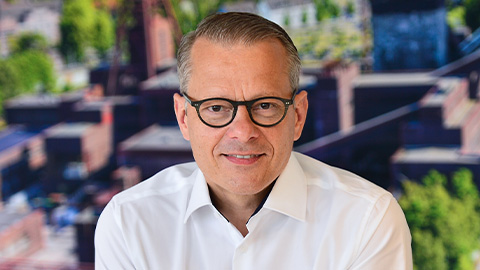

Topic of the month:
Hydrogen studies
Hydrogen studies
In this edition I will be “tormenting” you with three hydrogen studies in the Topic of the Month. Why? It just happened in the course of the month. But it gave me the opportunity to think more intensively about the topic once again. It is already a topic in many conversations as it is. I am always a bit astonished at how quickly conversations turn to hydrogen, even with traders or salespeople. I also moderated some discussions on the topic. What particularly gets me thinking is the potential role or non-role for hydrogen in the heating market and the quality of the debate. Many stakeholders strictly oppose the use of “scarce” hydrogen in the heating market, mainly because the conversion of electricity into hydrogen is inefficient if the electricity can be directly used for heating purposes. It is a plausible argument. But the conclusion that climate-neutral hydrogen for heating should not be subsidised, that all subsidies should be allocated to electric heat pumps and district heating, and that the installation of new gas boilers should be banned is unsatisfactory, in my opinion. Hydrogen is one option for decarbonisation, and it would be important to design a framework that allows us to discover which option is under which conditions the most efficient solution. Perhaps it will never be hydrogen. But I think it is wrong to assume this in a kind of central planning approach. Perhaps this central planning is needed to make the Energiewende happen. I am not yet convinced and will continue to think about and discuss it.

TOPIC OF THE MONTH Hydrogen studies
Studies on the different aspects of a future hydrogen market are published almost daily. In the following, the intention is to give an overview of this study landscape. But three studies shall be introduced in more detail because they show the aspects of the current German discussion and the different perspectives nicely:
The German Hydrogen Council commissioned three research institutes of the Fraunhofer Group (System and Innovation Research (ISI), Solar Energy Systems (ISE), Energy Infrastructure and Geothermal Energy (IEG)) with a "Meta Study Hydrogen", to assess the future demand for hydrogen in Europe and Germany. The study was published at the beginning of June. The study is worthy of attention because the German Hydrogen Counsel is the official consultancy body for hydrogen of the German government and makes important recommendations for the implementation of the national hydrogen strategy.
The Öko-Institut, a research institute and thinktank focussing on ecological issues, did a study "Hydrogen Strategy 2.0" for Stiftung Klimaneutralität (Climate Neutrality Foundation), also a thinktank. At the end of May, the study was published and introduced at a press conference. Rainer Baake is the director of the foundation. Until the end of the last electoral term, he was secretary of state in the German Ministry of Economic Affairs and Energy (BMWi). Allegedly, Mr Baake is one of the fathers of the German Act on Renewable Energies (EEG). As the secretary of state, he pushed forward the German energy transition - often against resistance from the traditional energy industry. In Berlin, political observers wonder whether he will play a role in the next German government after the elections in September if the Green Party plays a major role in that government. Felix Matthes, who coordinates research of the Öko-Institut was a member of the team that worked on the study. He presented the results together with Mr Baake. Mr Matthes is one of the leading energy economists in Germany and a member of the National Hydrogen Council. This should be enough arguments to justify a closer consideration of the study.
Framework conditions
Regulation of hydrogen networks
The amendment of the German Energy Act with the new regulation of hydrogen networks was hard work. In the very last week of the current parliament, it was adopted on June 24. In the last edition, it was reported that the reason for the delay was not mainly the regulation of hydrogen networks but other topics that are included in the amendment of the Energy Act and other energy laws. But it was still debated during the last weeks whether the separate regulation of hydrogen and gas networks is indeed the appropriate approach. Associations and representatives of the gas industry and the municipally owned companies are said to have lobbied intensively for a joint regulation.
At the end of the day, the proposed regulation of hydrogen networks remained untouched. It was only supplemented by a resolution of the parliament. In the first chapter of this resolution, the parliament acknowledges that for the time being, a joint regulation of hydrogen and gas networks with the consequence of cross-subsidies between gas and hydrogen networks would not be compliant with European law and regulations. But the parliament emphasises that the adopted regulation is only the starting point "for the transition towards a joint regulation of hydrogen and gas networks compliant with European law".

Frequently asked questions
What is the energate Gasmarkt?
The energate Gasmarkt provides specialists and executives in the gas industry with up-to-date information and background information on the German and international gas market. The medium expertly explains the most important developments in the fields of market, law, politics and business. In addition, the energate Gasmarkt offers insider information such as market rumors and personal details.
What is the energate Jahresreport Gas?
The energate Jahresreport Gas traces the most important market developments of the year and provides a well-founded outlook for the coming months. Gas expert and insider Dr. Heiko Lohmann analyzes relevant events in politics, law and regulation as well as on generation, infrastructure and trade. In addition, the report provides information on changes in the corporate landscape and tracks price developments in market reports. Top decision-makers from the industry use the Jahresreport Gas as a compact chronicle of the year and to assess future market developments.
How often are these publications released and in which formats are they available?
The energate Gasmarkt is published monthly. Subscribers will receive the energate Gasmarkt as a print and PDF version in German and English. The Jahresreport Gas is published annually (beginning of December).
Can I purchase individual issues of the energate Gasmarkt?
Yes, you can purchase individual isses as print or PDF version. Payment options include purchase on account, credit card or PayPal.
How much is a subscription of the energate Gasmarkt and how much does the Jahresreport cost?
A subscription to the energate Gasmarkt (single licence) costs 110,- Euro/month (plus VAT). An edition of the Jahresreport Gas costs regularly 390,- euro (plus VAT).
Are there any special conditions if several employees in a company would like to receive the Gasmarkt?
With several Gasmarkt recipients in one company, the price of the second and all other licenses is reduced significantly. We are happy to make you a fair offer for team or corporate licenses!
What benefits do I get by registering?
A free energate account is required to order the energate Gasmarkt or the energate Jahresreport Gas. Registered users receive an overview of the contents of the current issue of energate Gasmarkt by e-mail on the day of publication.
I would like to read energate Gasmarkt or energate Jahresreport Gas digitally. Where can I find my e-paper version?
As a subscriber to energate Gasmarkt or as a purchaser of energate Jahresreport Gas, you will also receive an e-paper version in addition to the print edition. You can find it at online.energate-gasmarkt.de. Please use your energate account to log in.

